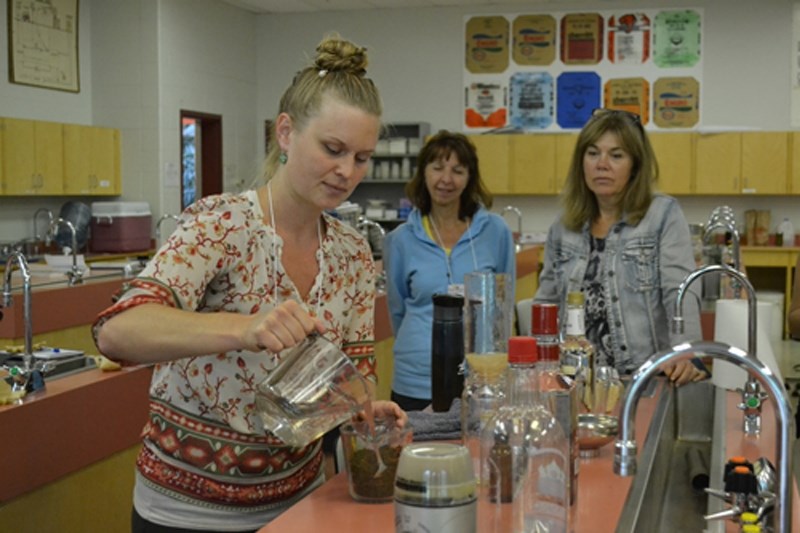Lots of plants in your garden or around Olds – even dandelions – can be made into medicines, according to Jenni Cyman.
Cyman, 29, of rural Red Deer, taught about 12 people how to do just that July 18 during a course entitled ‘Introduction to Plant Medicine; Theory, Spirit and Practice'. The course was one of many offered during Hort Week at Olds College.
Cyman is currently taking a clinical herbal apprenticeship from Abrah Arneson, a clinical herbalist from the Green Clinic in Red Deer.
“I want to teach these people that herbal medicine is accessible to the layman; to the mother, to the sister, to the professional, to the technician,” she said during an interview with the Gazette. “It's accessible to anybody.
“I didn't even have to leave the parking lot here to identify more than five. We have red clover, raspberry leaf, dandelion of course, goldenrod right here in the parking lot, and there is a balsam poplar tree out there. I guarantee there's an aspen growing around here somewhere – and a willow.”
She said aspen, willow and balsam poplar all have salicylates in them. Those are naturally-occurring products that can be used as drugs – or the bases from which drugs can be made.
In the case of dandelions, virtually the whole plant can be utilized.
“It's a bitter and it works on the liver. It will stimulate digestion; it will stimulate digestive juices. It will stimulate the production of bile. It has really good action on clearing the skin as well,” she said.
“The leaf is one of the best diuretics,” she said.
She said for medicinal purposes, dandelions can be eaten in salads or ground up and made into smoothies.
The dandelion flower can also be utilized.
“Of course it's not as strong as the other parts of the plant, but it's still going to be beneficial, for sure,” she said.
According to Cyman, hawthorn trees, which she has seen planted near Red Deer, can be used to combat blood pressure problems.
“You use the berry, the leaf and the flower,” she said. “If you have low blood pressure it'll bring it up. If you have high blood pressure it'll bring it down. It's really versatile that way.”
Another useful plant is the motherwort, which, according to Cyman, grows “really well” in this area.
“Motherwort is also a useful herb for cooling down an overactive thyroid; so hyperthyroidism. Motherwort and lemon balm are really good herbs for those. And of course, if you have hypothyroidism, you would want to stay away from those two herbs,” she said.
During the course, St. John's Wort was ground up and combined with vodka (40 per cent alcohol) to create a medicine, which, according to Cyman can cure depression and can last “forever.”
She said centuries ago it was also used to heal wounds, and was thus known as “wound wort.”
Raspberry leaves will do the same thing, according to Cyman.
“If you have a raspberry plant in your yard, you can take the raspberry leaf and chew it up and put it on there. Or if you have dried raspberry leaves in the cupboard for tea, you can, again, chew them up and put a Band-Aid over it if you need to,” she said.
A mixture of alcohol and balsam poplar buds can also be created to cure headaches, according to Cyman.
“There are many types of headaches,” she said. “It doesn't work on all types, but it works on most types. And it has a really fast action, because the salicylates in the balsam poplar are absorbed into the bloodstream, so it's really good, especially if you take it under the tongue. That's where you take your vitamin B-12 pills, right? Because it sucks it into the bloodstream immediately there.”
Willow bark or trembling aspen can also be utilized.
In that case though, “the salicylates have to mingle with the gut bacteria to become salicylic acid and so it takes a few hours before you get the effects,” she said.
“But they're much longer lasting, so that would be for inflammatory conditions like arthritis, or something where you want long-term kind of pain relief and you're taking it a little bit more regularly, so it doesn't matter if it takes a few hours to kick in,” she said.
Patients should consult their physician before making any changes to their medication.
"I want to teach these people that herbal medicine is accessible to the layman; to the mother, to the sister, to the professional, to the technician. It's accessible to anybody."JENNI CYMAN INSTRUCTOR



